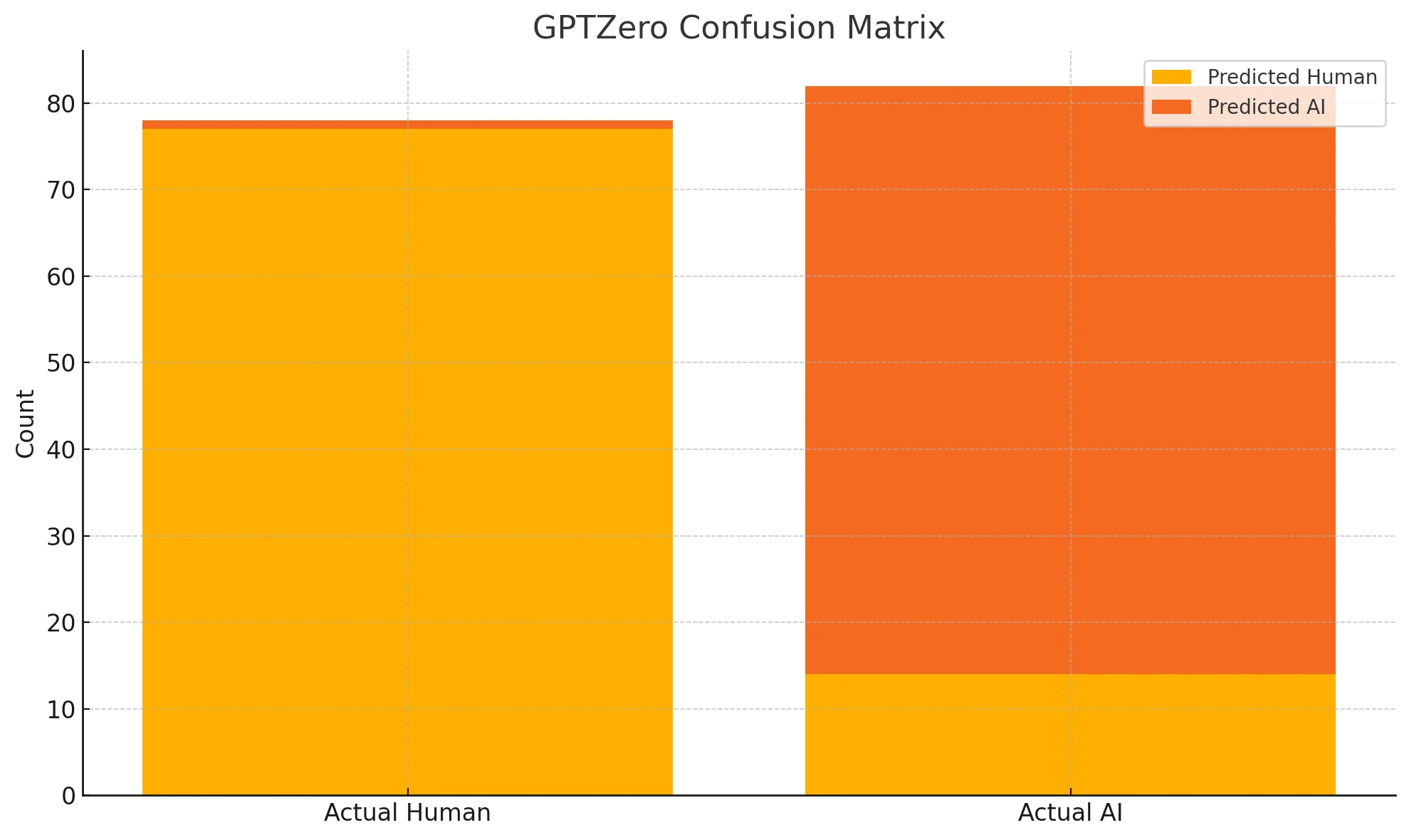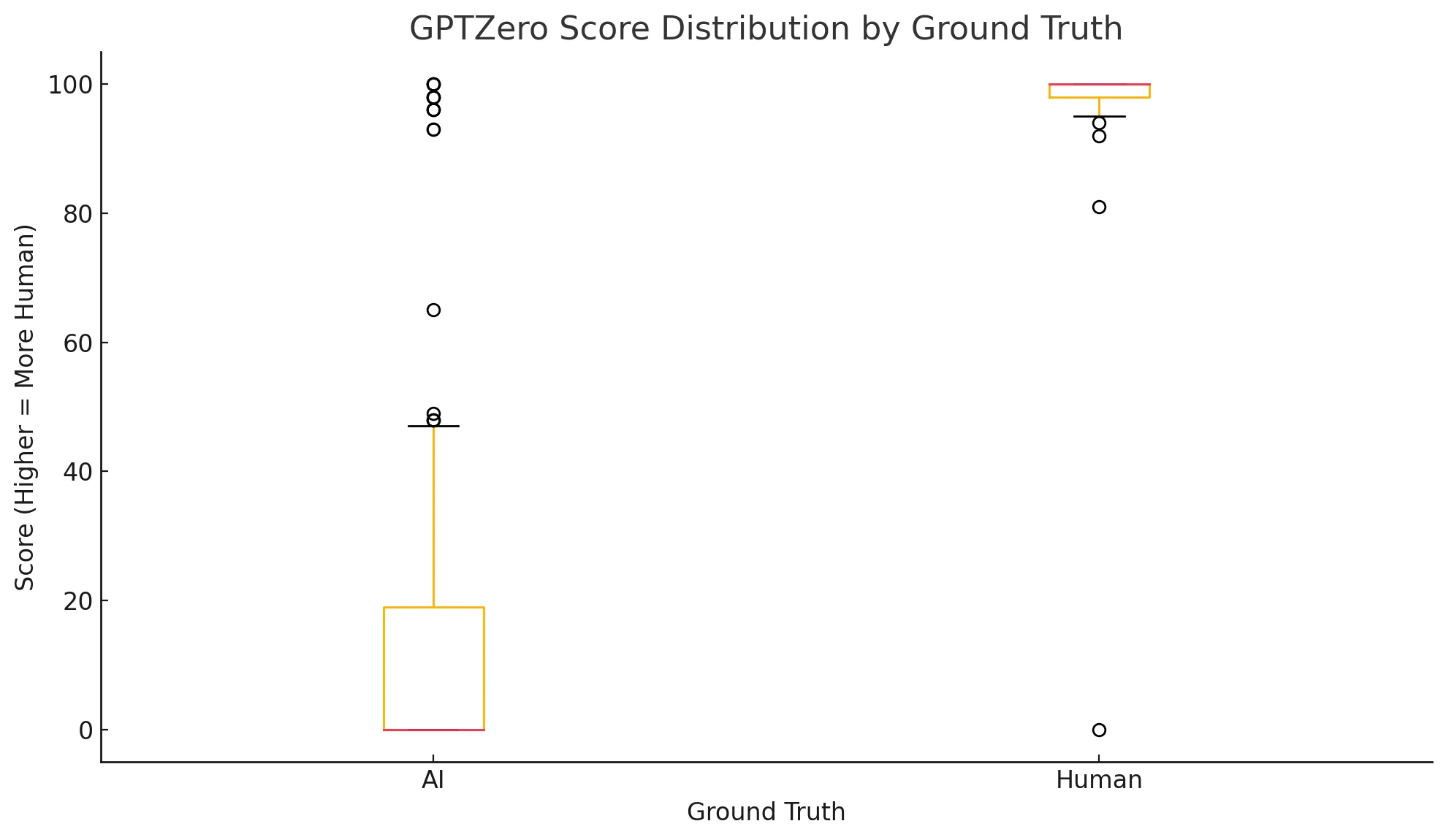As AI writing tools proliferate, the need for detection has skyrocketed. GPTZero is one of the most prominent AI detectors on the market, claiming it can distinguish between human and machine syntax. But is it actually as accurate as it claims, or is it just another tool making unsubstantiated promises?
The Short Verdict: Yes, GPTZero is reliable enough for general use. Our internal testing shows an overall accuracy of 90.6%. However, the nuance lies in how it fails: it is excellent at identifying humans correctly but occasionally struggles to catch every piece of AI content.
Why GPTZero’s Accuracy Metrics Matter
No AI detector is perfect. If you are a teacher, editor, or content publisher, the question isn't just "does it work?"—it is "how does it fail?" knowing the difference between a False Positive (accusing a human of using AI) and a False Negative (letting AI text slip through) is critical for your workflow.
By analyzing our specific metrics, you can decide if GPTZero is safe enough for your specific needs.
Also Read: Can GPTZero detect Quillbot?
The Methodology: Key Results from 160 Samples
To provide an unbiased review, we conducted an original study testing GPTZero using 160 distinct text samples. Our dataset consisted of a balanced mix to ensure fairness:
- Total Samples: 160
- Human-Written: 78 samples
- AI-Generated: 82 samples
Performance Breakdown
- Extremely Safe for Humans: GPTZero barely mislabeled human writing. Only 1 out of 78 human texts was falsely flagged as AI.
- AI Detection Gaps: It missed approximately 14 AI texts (roughly 17% of the AI data), classifying them as human.
- Overall Accuracy: The tool achieved a solid 90.6% accuracy rate across the board.
In simpler terms: GPTZero is "conservative." It errs on the side of caution to avoid falsely accusing humans, even if that means letting some AI text pass undetected.
The Data: Comprehensive Accuracy Table
For the data enthusiasts, here is the raw breakdown of our testing results. These numbers dictate the reliability of the tool:
| Class | Precision | Recall | F1-Score | Support (Count) |
|---|---|---|---|---|
| Human | 0.846 | 0.987 | 0.911 | 78 |
| AI | 0.986 | 0.829 | 0.901 | 82 |
| Overall | - | - | 0.906 | 160 |
What Do These Stats Actually Mean?
- Precision (0.99 for AI): This is the "Trust Score." If GPTZero says a text is AI, it is almost certainly AI. It rarely cries wolf.
- Recall (0.83 for AI): This is the "Catch Rate." GPTZero catches about 83% of AI content. That means about 17% of AI text slips past the radar.
- F1-Score (0.90): This represents the balance between precision and recall. A score of 0.90 is considered high performance in machine learning contexts.
Visualizing the Errors: Confusion Matrix
A confusion matrix helps us visualize exactly where the model makes mistakes. As you can see in the chart below, the errors are not evenly distributed.

Analysis: The bar chart confirms that GPTZero has a very strong bias toward protecting human writers. With only 1 false positive out of 78, it is one of the safer tools to use in academic or professional settings where false accusations can be damaging. However, the 14 AI misses suggest that sophisticated prompting might still bypass the detector.
Also Read: Does GPTZero Detect Claude AI?
Distribution of Scores: The Box-Plot Analysis
We analyzed the internal scoring probability assigned by GPTZero to see how confident the tool was in its decisions.

The box plot reveals a distinct separation:
- Human Texts: The median score hovered around 99% probability of being human. The tool is usually very confident when it sees human text.
- AI Texts: The median was near 0% (pure AI).
- The "Danger Zone": We noticed a small cluster of AI texts scoring in the mid-range. These are the outliers that tricked the detector, likely contributing to the 17% miss rate.
Final Opinion: Is It Good Enough?
GPTZero’s overall accuracy stands at 90.6%. In the world of AI detection, this is a competitive score. Its greatest strength is its safety mechanism: it almost never raises false alarms on genuine human writing.
My Recommendation
In my professional opinion, GPTZero is excellent for initial screening, but it should not be the sole arbiter of truth:
- For Avoiding False Accusations: It is top-tier. You can trust that if it says "Human," it likely is.
- For Catching All AI: If your mission is to catch 100% of AI-generated text, do not rely on GPTZero alone. You should pair it with a manual review process or a secondary AI detector to catch the 17% that slips through.
Conclusion
So, is GPTZero accurate? Yes. If your main concern is protecting human writers from false accusations, GPTZero is one of the best tools available. However, if you require a foolproof net that catches every single instance of ChatGPT or Claude, you must accept that no detector is 100% perfect—and GPTZero is no exception.
![[STUDY] How accurate is GPTZero? - An Independent Analysis!](/static/images/how-accurate-is-gptzeropng.webp)


